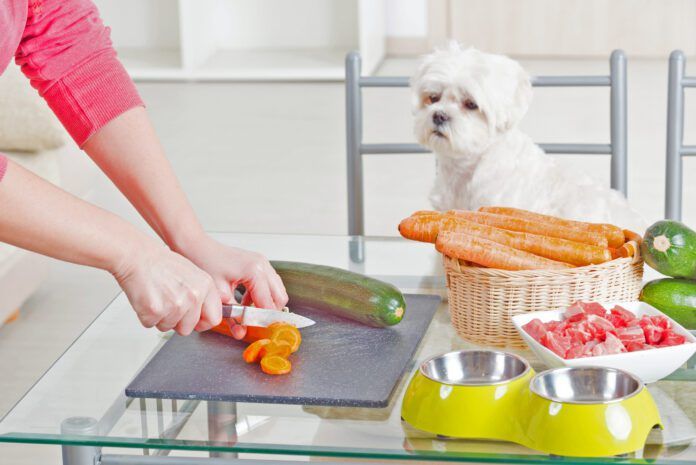The idea of preparing homemade dog food appeals to many people. Homemade diets allow dog owners to control what goes into their dog’s food bowl and provide their dog with individualized care. The problem, however, is that homemade dog food recipes are often nutritionally incomplete, which means they don’t supply dogs with all the nutrients needed for good health.
The risks associated with nutrient variability in ingredients, lack of proper testing, and the potential for deficiencies, toxicities, and nutrient imbalances can make homemade dog food hazardous for long-term canine health. However, when formulated correctly with the right supplementation and professional guidance, homemade dog food can be a healthy and rewarding option for you and your dog.
Inconsistent Nutrient Content in Dog Food
One of the biggest challenges with homemade dog food is the inconsistency of nutrient content in raw ingredients. Ingredients such as meats, vegetables, and grains can vary widely in nutrient content depending on their growing conditions, seasonality, source, storage conditions, and processing methods.
Meat: In meat, protein content, fat levels, and micronutrient density can differ based on the animal’s diet, breed, and age. For example, grass-fed beef contains higher levels of omega-3 fatty acids than grain-fed beef, but it may be lower in other essential nutrients.
Vegetables: In vegetables, the vitamin content can decrease significantly during storage or improper cooking. B vitamins are highly sensitive to heat and degrade over time.
Grains and Legumes: Some grains and legumes contain anti-nutrient factors that can interfere with the absorption of essential nutrients. These variabilities are accounted for in many commercial foods by performing batch testing on raw ingredients before they are used.
Cooking Methods: How you cook your dog’s food can play a role in nutrient availability. The cooking process may destroy or reduce some nutrients, while increasing the availability of others, leading to imbalances that cannot be accounted for when looking at the nutrient composition of the ingredients alone.
Complete and Balanced Dog Food
Commercial dog foods must meet standards set forth by the Association of American Feed Control Officials (AAFCO) and undergo nutrient analysis testing in a laboratory to confirm the guaranteed analysis listed on the packaging. Homemade diets rarely undergo these tests, as they are expensive and require sending the diet to an external laboratory for analysis.
Even recipes that seem balanced may fail to provide complete and consistent nutrition. A research team at University of California, Davis, examined 200 recipes and found that 95% of the recipes they looked at were deficient in at least one essential nutrient and over 83% of these recipes contained multiple nutrient deficiencies.
Because dogs have specific dietary needs, missing even one essential nutrient can lead to severe health problems over time. When formulating a diet, not only do you need to worry about deficiencies and toxicities, but nutrients can also interact with each other, causing synergies or antagonisms. This means that, even though the nutrients in the diet may be within a normal range, their reactions with other nutrients impact absorption and utilization in the body and may cause deficiencies or toxicities. These complexities make formulating a balanced homemade diet extremely difficult without expert guidance.
Help with Homemade Dog Food Preparation
If you want to home-prepare meals for your dog but want scientific precision, there are tools and resources available to help pet owners take some of the guesswork out of their diet formulation. Do not rely on random internet recipes. Instead, use Balance.it, PetDiets, or consult a veterinary nutritionist to ensure your recipe meets all the nutritional requirements for your pet.
Balance.it is one of the most popular formulation sites. Developed and approved by board-certified veterinary nutritionists, Balance.it offers a comprehensive solution for pet owners seeking to prepare nutritionally balanced homemade diets for their dogs. The platform provides a powerful recipe generator that tailors meal plans to your dog’s specific needs, ensuring the correct proportions of meats, vegetables, and other ingredients. Users can select ingredients and the website will generate a recipe based on nutrient levels. Balance.it also supplies essential supplements that deliver all necessary vitamins, minerals, and amino acids to guarantee complete and balanced nutrition.
PetDiets is another reputable company that provides formulation guidance from board-certified veterinary nutritionists. PetDiets offers a tailored approach for pet owners interested in preparing nutritionally balanced homemade diets for their dogs. Their automated online tool provides access to over 100 veterinary nutritionist-certified recipes, ensuring meals are complete and balanced for long-term feeding when prepared as directed. For those seeking personalized guidance, owners can request a customized homemade diet formulated for their dog’s specific needs. If your dog has specific dietary restrictions or health issues, the team of veterinary nutritionists at PetDiets can provide the guidance needed to ensure your pet is receiving all they need to thrive.
Even when using fresh, high-quality ingredients, homemade dog food often requires additional supplementation to meet all nutrient requirements. Balance.it, Annamaet, and The Farmer’s Dog are just a few of the homemade dog food supplements available on the market. The veterinarian nutritionist or formulation software you are working with will be able to recommend a supplement to complete a diet.
These supplements are not interchangeable, so be sure to stick with the product that is recommended. Also be sure to cook the ingredients according to the directions; over or undercooking ingredients can impact their nutrient availability and digestibility. Proper storage is also important. Keeping a home-cooked product for longer than recommended can result in the degradation of vitamins and other nutrients.
By following a science-backed tool like Balance.it, working with board-certified veterinary nutritionists, like those working with PetDiets, using high-quality supplements, and ensuring proper cooking and storage, you can ensure you are providing a safe and balanced homemade diet that supports your dog’s health and well-being.






